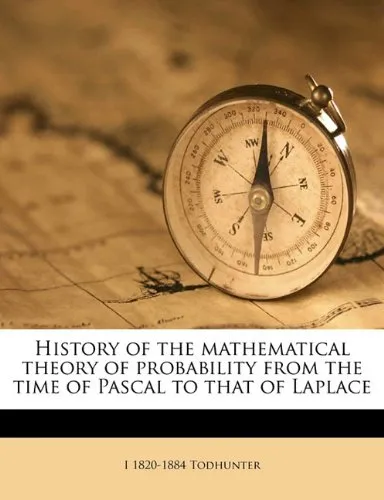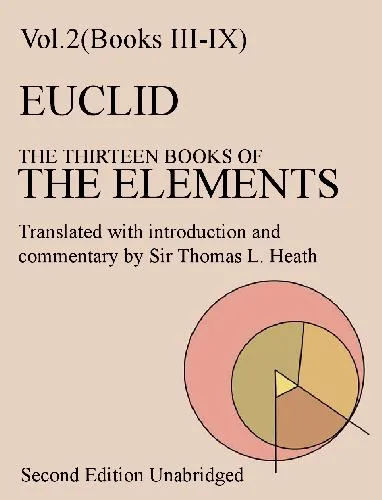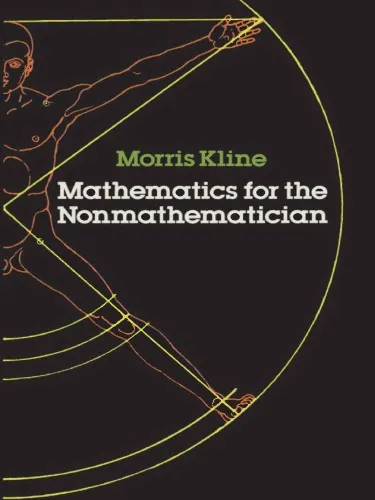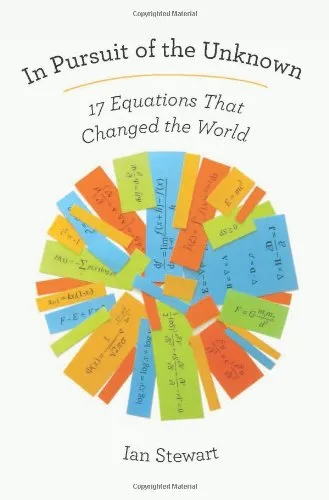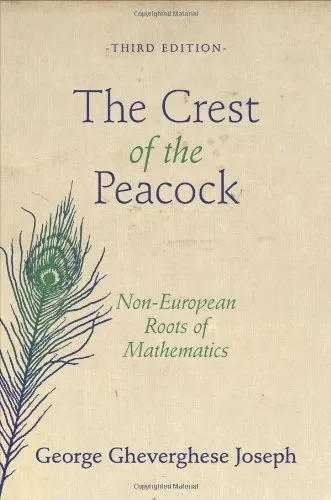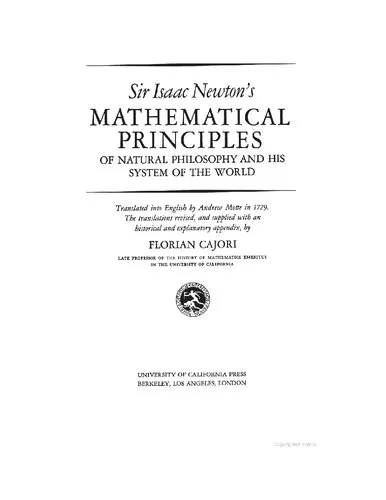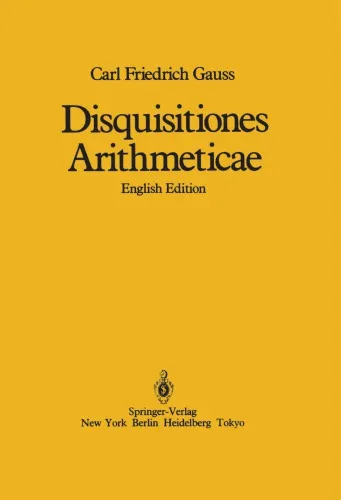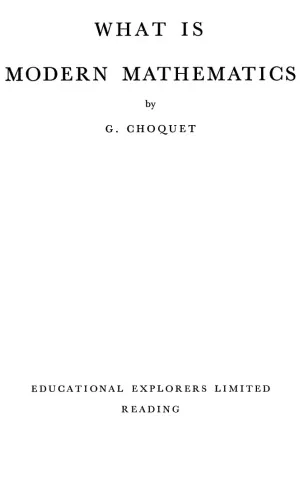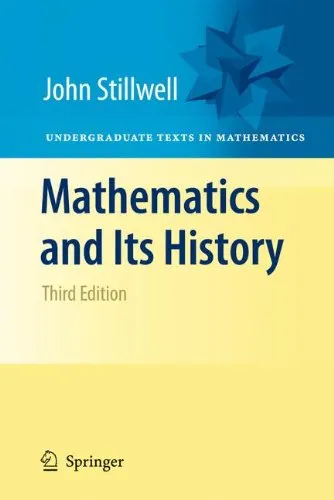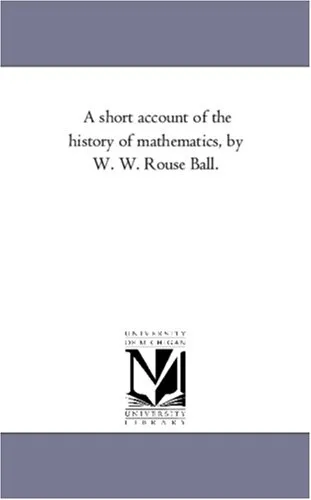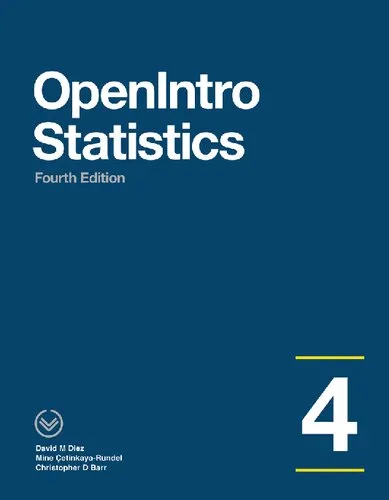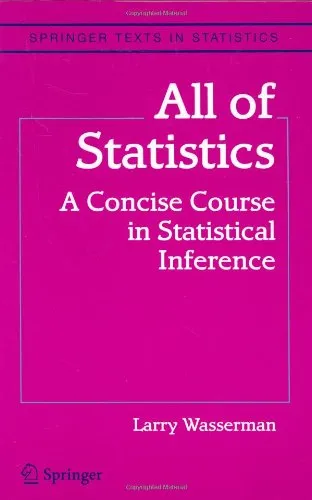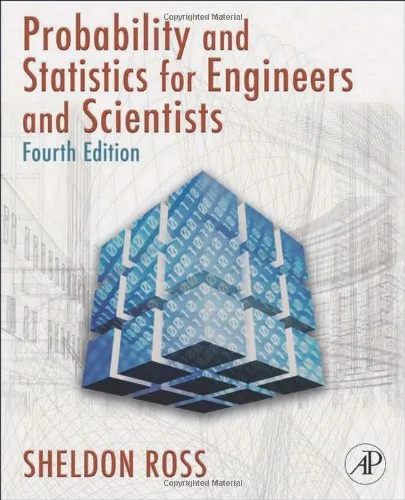A History of the mathematical theory of probability from the time of Pascal to that of Laplace
4.4
بر اساس نظر کاربران

شما میتونید سوالاتتون در باره کتاب رو از هوش مصنوعیش بعد از ورود بپرسید
هر دانلود یا پرسش از هوش مصنوعی 2 امتیاز لازم دارد، برای بدست آوردن امتیاز رایگان، به صفحه ی راهنمای امتیازات سر بزنید و یک سری کار ارزشمند انجام بدینکتاب های مرتبط:
معرفی مفصل کتاب "A History of the Mathematical Theory of Probability from the Time of Pascal to that of Laplace"
کتاب "A History of the Mathematical Theory of Probability from the Time of Pascal to that of Laplace" نوشته من، آیزاک تادهانتر، یکی از مهمترین منابع تاریخی در فهم عمیق تحول ریاضیات و مفهوم احتمالات در طول تاریخ است. این کتاب به بررسی ریشههای نظریه احتمالات و تکامل آن از زمان فیلسوف و ریاضیدان نامدار، بلز پاسکال، تا کارهای پیشگامانهی پیر-سیمون لاپلاس میپردازد. در این معرفی، به شرح بخشهای مختلف کتاب، نکات کلیدی و دلایل اهمیت آن در دنیای علوم خواهیم پرداخت.
خلاصه مفصل کتاب
این کتاب با ارائه پیشزمینهای در مورد ماهیت و تاریخ نظریه احتمالات آغاز میشود. من در مقدمه توضیح میدهم که چگونه رشد این شاخه از ریاضیات با نیازهای عملی مانند بختآزمایی و بازیهای شانس، و همچنین سوالات فلسفی دربارهی شانس و عدم قطعیت پیوند خورده است. کتاب سپس وارد بررسی عمیق کارهای اولیه بلز پاسکال و پییر دو فرما میشود که پایهگذار روشهای محاسباتی نظریه احتمالات بودند.
بخشهای بعدی کتاب به کارهای کریستین هویگنس، ژاک برنولی، و آبرهام د موآور اختصاص دارد. این دانشمندان راهحلهایی برای مسائل پیچیدهتر و کاربردهای جدید احتمالات ابداع کردند. یکی از ویژگیهای برجستهٔ این دوره، توسعه قوانین بزرگ اعداد و توزیعهای آماری است که پایهٔ علم آمار مدرن را تشکیل میدهد.
در نهایت کتاب به اوج خود میرسد، یعنی بررسی دستاوردهای پیر-سیمون لاپلاس. لاپلاس نقش غیرقابل انکاری در تکامل نظریه احتمالات ایفا کرد و آن را به ابزاری قدرتمند برای مدلسازی پدیدههای طبیعی و اجتماعی تبدیل ساخت. او همچنین قضیه معروف بیز را گسترش داد و آن را به یکی از مبانی اصلی احتمالات مدرن بدل کرد.
نکات کلیدی
- پیدایش نظریه احتمالات ارتباط نزدیکی با مسائل عملی در زمینههایی چون تجارت، بختآزمایی و بازیها دارد.
- مطالعات پاسکال و فرما پایهگذار ریاضیات سیستماتیک احتمالات بودند.
- قوانین بزرگ اعداد و توزیعهای آماری توسط برنولی و د موآور توسعه یافتند.
- پیر-سیمون لاپلاس نظریه احتمالات را به ابزاری قوی برای تحلیل علمی پدیدههای پیچیده تبدیل نمود.
نقلقولهای معروف از کتاب
"The theory of probability is at once sublime and practical, teaming with mathematical variety, and applicable to all the questions of life." - Isaac Todhunter
"From chance to certainty, probability emerges as a guiding principle of scientific inquiry." - Isaac Todhunter
چرا این کتاب مهم است؟
این کتاب نه تنها یک مستند تاریخی جذاب است؛ بلکه نشان میدهد چگونه ریاضیات، بهطور خاص نظریه احتمالات، در حل مسائل واقعی تأثیر دارد. کاربردهای این نظریه در دنیای مدرن همچنان گسترده است و این اثر کلاسیک راهنمایی بیبدیل برای دانشمندان، تاریخدانان علم، و علاقهمندان به ریاضیات به شمار میآید. با مطالعه این کتاب، خوانندگان درک دقیقتری از تأثیرگذاری پاسکال، فرما، برنولی، و لاپلاس در شالودهریزی اصولی به دست میآورند که همچنان در دنیای امروز مورد استفاده قرار میگیرد.
این اثر همچنین الهامبخش نسلی از علاقهمندان به تاریخ علم بوده است و همچنان بهعنوان منبعی معتبر برای پژوهشها در زمینه تاریخ نظریه احتمالات باقی مانده است.
Introduction to 'A History of the Mathematical Theory of Probability from the Time of Pascal to That of Laplace'
Mathematics has always been an integral part of the intellectual foundation of human thought, and within this vast domain, probability theory serves as a bridge between pure logic and real-world uncertainties. My work, "A History of the Mathematical Theory of Probability from the Time of Pascal to That of Laplace," delves deeply into the origins and evolution of this fascinating field, offering readers an academic and historical perspective on how the fundamental concepts of probability were established, refined, and mathematically formalized.
This book chronicles the theoretical advancements made from the time of Blaise Pascal, who laid the groundwork for modern probability alongside Pierre de Fermat, to the revolutionary contributions of Pierre-Simon Laplace, whose work matured the subject and interwove it with other mathematical disciplines. By tracing this historical journey, I aim to showcase not only the growth of mathematical probability but also the pivotal roles of individual thinkers and societal influences in shaping the theory as we know it.
Detailed Summary of the Book
The book unfolds in a way that readers are guided through the gradual development of probability theory. It begins with an exploration of the 17th-century breakthroughs made by Pascal and Fermat, who addressed the famous "Problem of Points," marking the inception of systematic probabilistic thinking. Through their correspondence, we see how fundamental principles like expected value and the building blocks of combinatorics became integral tools for addressing questions of chance.
The subsequent chapters traverse the contributions of mathematicians such as Christiaan Huygens, Jacob Bernoulli, and Abraham de Moivre. Huygens' treatise on games of chance is considered the first published work on probability. Bernoulli expanded on such results, especially with his celebrated Ars Conjectandi, where he introduced the law of large numbers. De Moivre, meanwhile, addressed problems in actuarial science and introduced the bell-shaped curve, foreshadowing the normal distribution.
Central to the narrative is the monumental work of Pierre-Simon Laplace, who synthesized earlier contributions into a cohesive framework. His development of the principle of insufficient reason, his expansion of the central limit theorem, and his analytical approach to probability are explored in great depth. Laplace’s Théorie Analytique des Probabilités takes the theory to new heights and cements its necessity across domains like astronomy, physics, and social sciences.
Key Takeaways
- Probability is not merely a mathematical abstraction but a tool rooted in practical problems, from games of chance to the modeling of uncertainties in nature.
- The historical timeline of probability theory reveals the gradual amalgamation of intuition, combinatorics, and rigorous analysis.
- Histories, such as this one, highlight that mathematical progress is almost always collaborative, often involving correspondence between thinkers of different generations and nations.
- Laplace’s work unified earlier scattered contributions and introduced probability as a tool of universal application, influencing modern sciences vastly.
Famous Quotes from the Book
"Probability begins in the mind as conjecture, takes concrete shape in mathematics, and goes forth to make sense of the world’s uncertainties."
"The correspondence between Fermat and Pascal marks not only the birth of probability theory but a shift in human thought from subjective judgments to formal rules."
"Laplace, through his analytical lens, transformed our understanding of chance, creating a mathematical language that resonates across the natural and social sciences."
Why This Book Matters
This book stands as a testament to the dynamic interplay between mathematics and philosophy, demonstrating how abstract ideas can evolve into practical tools for solving real-world problems. The value of understanding the history of probability theory lies in its empowering insights—by examining how early thinkers approached uncertainty, modern readers are introduced to the creativity and rigor required for intellectual progress.
For mathematicians, philosophers, historians, and anyone captivated by the evolution of knowledge, "A History of the Mathematical Theory of Probability from the Time of Pascal to That of Laplace" offers more than just facts. It provides a narrative that connects science to humanity, reasoning to intuition, and the abstract to the practical. This subject remains profoundly relevant today, not only in its theoretical elegance but in the countless applications that permeate science, technology, economics, and beyond.
دانلود رایگان مستقیم
شما میتونید سوالاتتون در باره کتاب رو از هوش مصنوعیش بعد از ورود بپرسید
دسترسی به کتابها از طریق پلتفرمهای قانونی و کتابخانههای عمومی نه تنها از حقوق نویسندگان و ناشران حمایت میکند، بلکه به پایداری فرهنگ کتابخوانی نیز کمک میرساند. پیش از دانلود، لحظهای به بررسی این گزینهها فکر کنید.
این کتاب رو در پلتفرم های دیگه ببینید
WorldCat به شما کمک میکنه تا کتاب ها رو در کتابخانه های سراسر دنیا پیدا کنید
امتیازها، نظرات تخصصی و صحبت ها درباره کتاب را در Goodreads ببینید
کتابهای کمیاب یا دست دوم را در AbeBooks پیدا کنید و بخرید
1489
بازدید4.4
امتیاز0
نظر98%
رضایتنظرات:
4.4
بر اساس 0 نظر کاربران
Questions & Answers
Ask questions about this book or help others by answering
No questions yet. Be the first to ask!
